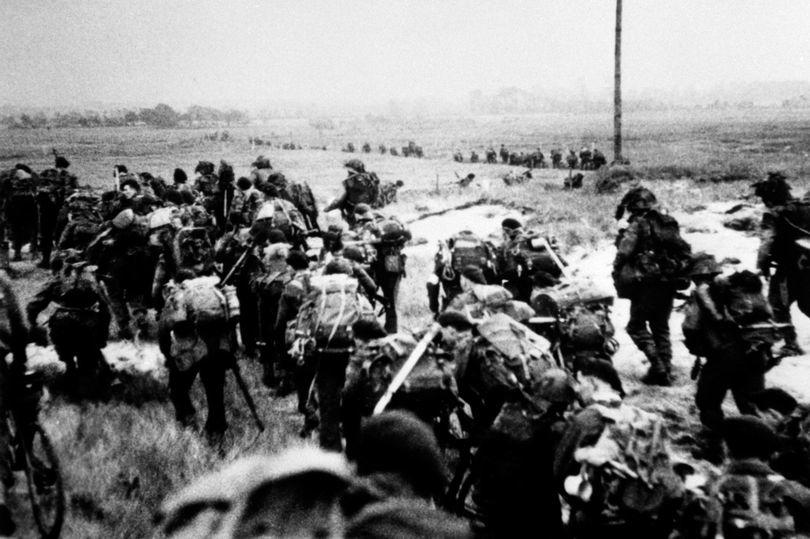I saw German bomber light up terraced house as a boy, then helped storm D-Day beaches as a man
A 99-year-old war hero who played a significant role in the 1944 landings marked D-Day with a concert featuring wartime music.
Alvin Ansell, who is a resident of Braeside Home For The Elderly in Oswaldtwistle, commemorated the day of remembrance with a concert at the home, taking him back to his war days. Alvin, who will turn 100 in July, worked as an office-boy for his first job in a large printing press, Henderson and Spalding in Peckham.
He used to cycle to work through the chaos of the previous night’s bombing raid to reach the office by 8.30am. One day he was told to deliver some proofs to Camberwell Town Hall and as he was returning to the office through the back streets, he arrived in the Asylum Road area just in time to meet a lone, low-flying German bomber on its escape route after having just bombed Buckingham Palace.
The plane dropped an oil-filled incendiary bomb which landed in the front garden of a terraced house. He said: “I watched helplessly as the little dwelling began to go up in flames.
READ MORE
Inside the 'Disneyland of McDonald's' that people travel from Lancs to visit
UK heatwave maps pinpoint exact date 28C highs will hit and where they'll be
“I had to get back to the office on time and I remember feeling surprised when no-one there asked why my face and clothes were all sooty. It was not long after this that I arrived at work one morning to find that the presses and office had received a direct hit in the raid overnight.
“Father decided it was getting too dangerous in London so he moved us out to the comparative safety of Chelmsford in Essex.”
He joined the Home Guard battalion and was issued with a khaki uniform and an old Lee Enfield .303 rifle with a clip of five bullets, to be used only in case of invasion, which was at that time considered imminent.
The battalion were trained to man and operate the new anti- aircraft rocket firing installations which were being put up to defend London. Alvin volunteered for the Royal Navy and, at the start of 1943, he completed his training at the famous old stone frigate HMS Ganges near Harwich and then went on a specialist training course in radar, which was at that time a new and secret weapon.
He was directed to HMS Victory at Portsmouth and from there was sent on to become the then Lieutenant Commander Peter Scott’s radar operator on his flotilla leading steam gun-boat HMS Grey Goose.
Alvin remembers the Grey Goose lying in the harbour at Newhaven from where the steam gunboats operated, attacking German coastal convoys off the coast of Occupied France.
He continued: “We had several aggressive encounters with the German convoys and their well-armed escorts and our crews began to feel that it would not be long before something really nasty occurred.
“This event duly arrived on a balmy night in late September and we on Grey Goose were extremely lucky to get home again. When the time came for the invasion of Europe we were allocated to the United States sector and helped protect the Normandy bridgehead from D-Day onwards.
“This gave me a good view of the colossal battle to get ashore, especially at Omaha Beach. An abiding memory from that time is of the bodies of dead soldiers rolling in the Channel swell, surprisingly accompanied by a huge drift of little sachets of Nescafe floating among them.”

After a couple of brushes with the gallant German E-Boat squadron, still operating against overwhelming odds from their base in Cherbourg, they were so badly damaged in the Great Storm that they had to leave the beachhead invasion.
On their journey back to Southampton in mountainous seas, they had the misfortune to have one of their gunners washed overboard. Despite searching for an hour or more he was never seen again.
At Southampton they were sent on leave and paid off.
Alvin then was drafted to the Mediterranean to become radar operator on a brand new Motor Torpedo Boat which had just arrived in Malta from the United States on a liberty ship.
Alvin said: “This superb little British-designed craft also provided me with the very latest type of radar set and its efficiency and accuracy gave us a great advantage over the German convoy defence vessels as we attacked at night and sank them off the Yugoslav coast and the Istrian Peninsular.

“Although still dangerous, this was a much more comfortable sort of war than that which I had left in the English Channel. I was, in a way, sad when it ended in May 1945 with the surrender of all German forces in Europe.
“Before I was sent home for demobilisation I had to endure an unpleasant and boring month or two on a Fleet minesweeper, ploughing up and down off the North African coast clearing up some of the dangerous areas we and the Germans and Italians had left behind.”
Alvin settled down in Braeside Home for the Elderly in Oswaldtwistle in 2022 and now enjoys relaxing and doing the Daily Telegraph crossword daily.

 Yahoo News
Yahoo News 
